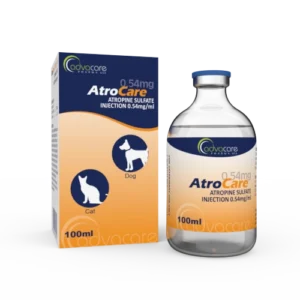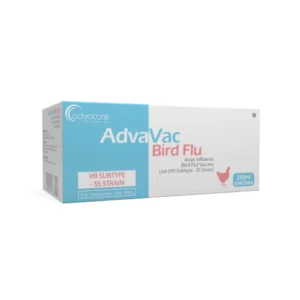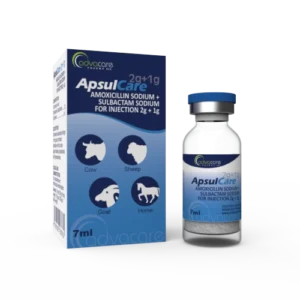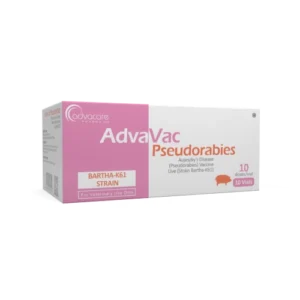What is Kanamycin Sulfate?
- Antibiotic
- Cat,
- Dog,
- Cow,
- Goat,
- Horse,
- Pig,
- Poultry,
- Sheep
Active Ingredients: Kanamycin Sulfate
Kanamycin Sulfate Injection is an antibiotic drug used to treat certain bacterial infections in animals such as cats, cows, dogs, goats, horses, poultry, sheep, and pigs. It is indicated for the treatment of respiratory, intestinal, or urinary tract infections. Kanamycin is also used to treat infections like bacterial endocarditis, sepsis, and mastitis.
Kanamycin is classified as an aminoglycoside antibiotic. It works by interfering with protein synthesis within the bacteria cell. It is effective against strains of bacteria such as E. coli, Proteus species (both indole-positive and indole-negative), Enterobacter aerogenes, Klebsiella pneumonia, Serratia marcescens, and Acinetobacter species. Kanamycin is also an antidiarrheal and an anti-infective agent.
Its mechanism of action involves halting the synthesis of essential proteins vital for bacterial survival. This antibiotic exerts a bactericidal effect on pathogens, particularly those undergoing rapid multiplication, employing multiple mechanisms for their destruction. A brief exposure is adequate to achieve the bactericidal effect. The primary target is the membrane-associated bacterial ribosome, disrupting protein synthesis. The initial interference occurs with the lipopolysaccharide through active cell transport. Gastrointestinal absorption is limited, with less than 10% absorption. Aminoglycosides exhibit increased permeability in neonates and during enteritis.
Optimal absorption is achieved through intramuscular administration, reaching peak blood concentrations within 30-90 minutes. For safety considerations, a recommended dosing frequency is once per day. Distribution within extracellular fluids is confined except in the kidneys and inner ear. Dehydration and sepsis may enhance the distribution of the drug.
Kanamycin does not penetrate cerebrospinal fluid, milk, ocular fluids, intestinal fluids, or prostatic secretions. Its excretion, largely unchanged, occurs through urine by glomerular filtration within 24 hours of administration. Elimination is contingent on cardiovascular function, age, fever, renal function, and other influencing factors.
Kanamycin Sulfate Injection is a colorless to light yellow or yellow-green transparent liquid.
It is important to note that Basil Hygiecare Kanamycin Sulfate Injection is for veterinary purposes only. Though there are similar medications for human usage, this particular formulation has been manufactured for use by an animal.
Why are we a trusted Kanamycin manufacturer?
Kanamycin Injection is manufactured and globally distributed by Basil Hygiecare, a leading manufacturer of veterinary injections in the pharmaceutical industry. We have been committed to distributing high-quality, GMP-certified veterinary medications for the global market over the past 20 years. As a top Kanamycin manufacturer, we ensure that all of our 100+ veterinary injections surpass our distributors’ requirements by conducting routine internal and third-party facility audits.
Precautions
Do NOT use Kanamycin Sulfate Injection for an animal that: • has a known allergy or hypersensitivity to any of the ingredients.
Keep this drug out of reach of children and animals.
What are the most common animals for which Kanamycin Sulfate for Injection is used?
Kanamycin Sulfate is primarily used for treating bacterial infections in animals and livestock. The specific common uses of Kanamycin Sulfate include treatment of the following diseases:
- piglet white diarrhea
- fowl cholera
- wound and postnatal sepsis
- erysipelas and edema in pigs
- brucellosis
- tularemia
- pneumonia
- campylobacteriosis
- leptospirosis
- endometritis
- endocarditis
- meningitis
- mastitis
- actinomycosis in cows
Ruminants (Cows, Goats, and Sheep) Bacterial Infections
This antibiotic is used for treating most of the gram-negative bacterial infections that occur in ruminants. This includes treatment of Brucellosis, pneumonia, and mastitis. Also, it is useful in treating endocarditis, endometritis, and meningitis. When applied, this antibiotic has bactericidal properties. For a fast recovery, it might be combined with supplements and other drugs.
Horse Bacterial Infections
This antibiotic in horses can be used for the treatment of many respiratory, gastrointestinal, or urinary tract infections. It can be used in the treatment of E.coli, Salmonella spp., Klebsiella spp, and Proteus spp. Infections.
Swine Bacterial Infections
Actinobacillus pleuropneumonia, erysipelas and edema, mastitis, and endometritis can be treated with this antibiotic in swine. It can also be used for treating many bacterial respiratory diseases.
Companion Animals Bacterial Infections
Kanamycin in companion animals can be used for infections in the respiratory, urinary, and gastrointestinal tracts. It may also be employed to address skin and soft tissue infections caused by susceptible bacteria.
The antibiotic choice and form of antibiotic depends on the diagnosis from the veterinarian. The veterinarian decides about the prescription of this drug in animals based on the current health condition. In some cases, a combination of other antibiotics and supplements is needed for complete treatment.
Uses
What is Kanamycin Sulfate used for?
It’s used to treat many types of bacterial infections such as:
- bacterial endocarditis
- respiratory tract infections, including swine enzootic pneumonia, swine pleuropneumonia pneumonia, and fowl chronic respiratory disease
- intestinal tract infections
- urinary tract infections.
- sepsis
- mastitis
- piglet white diarrhea
- fowl cholera
What animals can be treated with Kanamycin Sulfate Injection?
This medicine is recommended for companion animals, dog and cats, horses, poultry, and livestock, including pigs, goats, sheep, and cows.
Why is Kanamycin Sulfate for Injection used in animals?
This antibiotic is employed to manage both local and systemic infections caused by susceptible gram-negative bacteria. Specifically, it is utilized for the treatment of mastitis and, in certain instances recommended by a veterinarian based on the prevailing health condition, can be infused into the udder. Additionally, lower doses of this antibiotic can be administered for the treatment of gram-positive bacteria such as Staphylococci, albeit at more frequent intervals. The antibiotic is effective against a range of bacteria, including Actinomyces bovis, Pasteurella spp., E. coli, Salmonella spp., Campylobacter fetus, Leptospira spp., Brucella spp., and Mycobacterium tuberculosis.
How can Kanamycin Sulfate help in respiratory diseases?
If the respiratory disease is caused by a bacteria susceptible to this antibiotic, administering Kanamycin can lead to a fast and effective recovery. It will reduce the clinical signs of fever, nasal discharge, and difficulty breathing. It will also lead to improvements in the blood tests and urinalysis. It is very often used for treating tuberculosis in animals. Aminoglycoside antibiotics are one of the most effective antibacterial agents for tuberculosis. Around 72 strains of Mycobacterium tuberculosis are susceptible to this antibiotic.
How can Kanamycin Sulfate help in gastrointestinal diseases?
Adding this antibiotic when there is a present gastrointestinal disease can lead to immediate improvements. It will reduce the signs of gastrointestinal discomfort if it is caused by a bacterial infection. It will reduce the vomiting, diarrhea, constipation, and stomach upset. It will also improve the animal’s appetite and prevent weight loss and dehydration. It can be combined with other supplements and drugs for a speedy recovery. The inclusion of this antibiotic should be based on the antibiogram results.
The cause of piglet white diarrhea is E.coli, among other pathogens, and Kanamycin can lead to recovery when administered. It can reduce diarrhea in animals which is white or grey due to the undigested milk. It will also reduce the vomiting and improve the hydration in affected animals. When combined with other drugs, it can lead to normal appetite and normal weight gain.
Is Kanamycin Sulfate enough to treat a disease?
This medication possesses bactericidal properties, promoting a swift recovery. Its efficacy is influenced by the results of the antibiogram. Achieving complete recovery may require additional supplements and therapy. It is commonly administered for preventive use in animal surgeries.
How is a Kanamycin Sulfate for Injection used?
This medication has been manufactured as a liquid, which is packaged in a vial. It is intended to be administered by IM/SC/IV injection. Kanamycin Sulfate Injection is intended for veterinary use only.
At the moment of application, the area should be cleaned, and aseptic conditions must be provided. If the animal’s coat is excessively dirty, cleanse it before application. Use a reliable skin antiseptic like benzalkonium chloride in 70% alcohol, and refrain from applying it to dirty or infected skin.
How is a Kanamycin Sulfate Injection used?
This medication has been manufactured as a liquid, which is packaged in a vial. It is intended to be administered by IM/SC/IV injection. The veterinarian should decide the route of administration. Kanamycin Sulfate Injection is intended for veterinary use only.
How should Kanamycin Sulfate Injection be stored?
This medication should be stored in a dark, dry location under 30°C. The vial should be sealed tightly.
What is the withdrawal period for Kanamycin Sulfate?
The withdrawal time for meat is 35 days.
Dosage
How much Kanamycin Sulfate Injection should be given to cows, pigs, or sheep?
The usual dose is 1ml/kg of body weight, however, the proper dosage should be determined based on the animal species by a veterinarian.
The dosage might vary depending on the animal’s current health status. Also, the dosage is determined based on the animal’s species, age, and weight. The veterinarian can also manipulate the longevity of the treatment process based on the health improvements.
Refer to a veterinary doctor or pharmacist for guidelines on dosage.
Side Effects
As with all pharmaceuticals, some unwanted effects can occur from the use of Kanamycin Sulfate Injection.
Serious side effects may include:
- allergic reaction (skin rash, fever, facial swelling, or difficulty breathing)
- ototoxicity
- nephrotoxicity
- neuromuscular blocking effects (typically from overdose)
Ototoxicity in animals can lead to serious auditory or vestibular dysfunctions.
If you notice any side effects after administering this antibiotic, consult a veterinarian.
For a comprehensive list of all possible side effects of this medication, consult a veterinarian.







